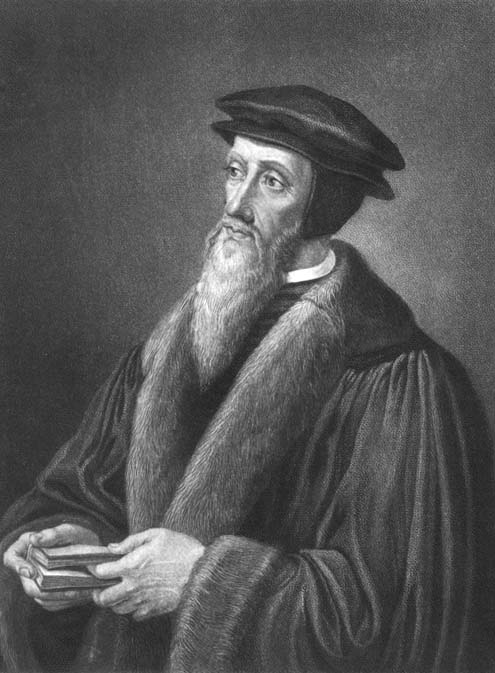
[David W. Ponter’s words will be in blue]
*****
It’s absurd to say that Calvin was a supralapsarian, even in kernel form.
It’s far less absurd than the claim that Augustine was a Reformed Protestant, in kernel form, or closer to Protestantism than to Catholicism. :-) Development takes place within Protestantism, and Calvin was too early for the most developed thought on that issue; yet things he wrote can certainly be harmonized with the notion, though speculative debate on his meaning is surely warranted.
I have provided several primary citations from Calvin, and cited several Reformed and Protestant scholars — far more acquainted with the topic than I am — who take exactly this position (so it is not merely my Catholic wishful thinking, special pleading, and creation of straw men):
For, firstly, those theological categories were not present in Calvin’s theological organum.
I know that (at least the word was not), but they don’t have to be, any more than the Chalcedonian terminology of the Two Natures not being present in the early Fathers. Yet they had views consistent with it, or rightly categorized as the developmental precursors of it.
Secondly, in many of his statements he expressly has an election out of a fallen and corrupt mass. Whereas supralapsarian has election out of a pure mass, as Beza later argued.
See the citations above. You can argue against Berkhof, Berkouwer, Bavinck, Hodge, et al, in addition to me. This is quite obviously a dispute within Calvinist circles, as well as with those outside that circle.
And please its better to cite the primary sources.
I have plenty above, and the Calvinists I cite are well familiar with them, I’m sure.
Its about getting back to the sources. That was the great call of both the Renaissance and the Reformation. My memory here is faulty, but was not the phrase ad fontis? It may be that just trusting in secondary sources is why folk go off into error (hint hint ;-). And I still think that a person who makes the claim, which in this context is very important, as it’s really about the veracity of the Reformation vs. the veracity of the Roman tradition, ought to seek the primary sources.
As I said before, there were plenty of Calvin’s own words in my paper. But you have repeatedly overlooked that.
. . . Add to that that even some of the secondary sources insist that 1, Calvin followed an infra line as well, and 2, there is no fundamental disagreement with Aquinas.
The obvious point here is: what Calvinist worth his salt could care less about what I think about anything Calvin wrote? It won’t carry any weight whatever with them. To many Calvinists, I’m not even a Christian, yet you think they will place credence in my opinions as to the interpretation of extraordinarily complex and paradoxical matters of predestination and sovereignty, as discussed in Calvin’s writings?
No, of course they won’t. So why should I bother? Therefore, I cite people whom they will respect. It’s common sense. If you would come down from your abstract theological heights for a second you would see this. Don’t get me wrong, I love speculative theology, but it tends to mitigate against common sense at times.
Not to mention the fact that I wouldn’t claim to possess anywhere near the skills or abilities to pronounce authoritatively on such matters anyway. These things are obvious. If I don’t know enough about a subject (this one definitely requires more theological education than I have), and have a good inkling that my opinions won’t matter anyway to people who think I can’t even figure out what the Gospel and Christianity is, then there is no reason to act as if I do know something I don’t, or to pretend that my opinions will matter at all to those I am communicating to.
It doesn’t take a rocket scientist to figure all this out. One thing I do know quite a bit about is rational argumentation, and what works and what doesn’t, depending on the target audience. As Paul said (paraphrasing, and applying his sage advice to this situation), “to the Calvinist I became as a Calvinist.”
My advice to you in the light of all this would be that you adopt a healthy of measure of agnosticism (“I personally don’t know” sort of thing) rather than assert statements that so far have not been sustained from the originals, yet that were also refuted from the originals in a previous interaction over the exact same topic, and wherein subsequent assertions have been based on only secondary (and tertiary sources, so to speak, that is sources who quote other secondary sources) you might be more cautious in bringing up the point.
I think it is a valid consideration to perhaps temper my language a bit in the paper (I probably did, as it was, but you know how apologetics and polemics can lead to excessive claims at times). I will look at it again and make sure my conclusions are stated more tentatively or in “agnostic” terms [I did indeed revise the first half of this paper – the original portion -, following this suggestion].
I am labouring this because in this context, this is really serious stuff. Your aim is to defend the Roman faith – you are using this as part of an overall polemic.
In an overall sense, yes, just as you defend so-called “Reformed” Christianity, but at the moment, to me it is an interesting point of historical theology. I love history of ideas and development of doctrine, so when I am discussing those things, oftentimes (as presently) “Catholic apologetics” is far from my mind, though I don’t deny that as a grand scheme and outlook, it would always be there underneath everything. This discussion would have been just as interesting to me when I was an Arminian evangelical, and I would have argued in almost exactly the same fashion. So “Catholicism” is not all that related to the topic at hand.
Its not about two academics bantering, yet who hold the same fundamentals. You know this. So in that light, I will prosecute counter-reformational arguments with all the truth at my disposal. I will call for the highest level of intellectual-historical-scriptural rigor that is possible . . . primary sources.
You know as well as I do that one’s interpretation colors what they write. You — or so it seems — have an agenda, too (probably more than I do). I would imagine that it’s very important to you that Calvin is seen as an infralapsarian, so that would bias your conclusions in that direction. Most of the scholars I cited are also infras. But they are fair and objective enough to concede a point of historical fact, as to Calvin’s views. To them, the question isn’t “absurd” at all, but a live question and a respectable one.
You are subject to interpretational presuppositions and bias, just as everyone else is. And that means I don’t have to take your word as Gospel truth. Is this so difficult to understand? So you think you proved x and y and z. Some other Calvinist comes along and demonstrates otherwise.
You yourself said there were a million different views on Calvin’s Calvinism, yet you want me to hang on your every word as an inspired oracle from God, as if all dispute is ended? You know better than that. But perhaps you are the proverbial fish in the fish bowl in this instance and can’t see the logical dilemma here.
The very fact that Calvin’s view (like Aquinas’s) has paradoxical elements in it (as you suggest) would tend to support their interpretation. That being the case, your characterization of “absurd” strikes me as a desperate recourse to strong language, where it isn’t warranted. I know enough about this to suspect that this is the case, even though I don’t pretend to understand all the nuances and particulars of the discussion itself.
By absurd, I mean it’s folly, it’s irrational. I am not saying it’s dumb. I am sorry if I gave that impression.
I understand that, but I think that too is absurd, based on what I’ve found.
As for what Catholics must believe on this, they are at liberty, because the subject is regarded as unable to be resolved, given our human limitations. Thus, I come down on the Molinist side, because that seems most plausible to me, after much pondering and debating the subject. I don’t claim that my view is either self-evident, or highly certain (as Calvinists routinely — and in my opinion, foolishly — do with regard to their views on predestination).
I view the whole thing as an amazingly complex and fascinating aspect of philosophical theology, having to do with the nature and attributes of God, just as my Church does.
I don’t think it has all that much to do with the Christian life, and coming to serve God with a fuller commitment and resolve; loving Jesus and our fellow men. We assert predestination dogmatically, but not active reprobation, as a decree of God without regard for the sins of the damned. If that is also Calvin’s position, then I rejoice in that. He has more than enough error for which he will stand accountable before God. The more truth he accepts, the better for his own soul.
To restate my argument, I don’t believe from reading Calvin that he thought in terms of the decrees being divided up into the sort of logical ordering demanded by the lapsarian schemas. For Calvin, God’s will was ultimately a unity, tho it appeared diverse to our finite minds. He was content to rest in the tension created in this dialectic. He never went beyond the stating of this apparent dialectic. Thus he will speak in terms of the unity of God’s will, and here “sound” supralapsarian. But then when the issue came to means of the causation of sin and the means of reprobation, he used infralapsarian concepts, such as a rejection of sinners, men out a corrupt mass, and the proximate and remote grounds for condemnation, and the willing permission of sin. He never expressed himself in lapsarian nuances or categories that later came to characterise the various lapsarian theologians. Thus, all the facts together, the claim that he was a supralapsarian is folly.
I hope this is the case, as it sounds much like the Catholic / Thomist position, which incorporates paradox, and acknowledges mystery.
I would like to see you interact with the man himself and with the greats of the Scholastic tradition. Otherwise, there is a sense you are just perpetuating a myth, an untruth – just as much as if I was to distort Thomas, as so many in the Reformed camp do.
I don’t claim to know enough to be able to make my own judgments on such complex matters, even satisfactorily to myself, let alone to anyone else.
. . . But once again in your two replies you don’t post primary source material. You post material that has an interpretation, and a grid therein already established.
Everyone has an interpretation, including you, so I fail to see how that is a relevant matter. That being the case, I favor 10-12 mostly Calvinist (and all Protestant) scholars who believe one thing, over against your different point of view. You can quibble about “generalists” and Schaff’s anti-Reformed bias (he’s no great friend of Catholicism, either) and all that until the cows come home, but that can’t overcome the “general” soundness of my approach of finding many Calvinists who agree with my (layman’s, relatively uninformed) position.
. . . generalist works are prone or liable to error . For example, you cite Walker’s work. I have read that work. Its a generalist work. It does not go into detail. Pelikan too, while being far superior to almost anything published of that genre, is also a generalist. He makes clear cut mistakes. He takes a pro-liberal line on modern theologians.
Duly noted, but it won’t make me remove quotes. These folks are still scholars, whatever you think of them, or wherever their specialties lie.
My default position, by the way, is that any articulate apologetic Romanist, is by default, defending salvation by faith and self-generated meritorious works.
It’s “Catholic apologist,” thank you. This is where you don’t understand our position in the first place. There is no such thing in Catholic theology as “self-generated meritorious works.” To be meritorious at all, works must be “generated” entirely by God and His grace. We merely cooperate. Cooperation is not the same as origination and invention. That is your logical fallacy.
Hey, as a side-line, Thomas did not teach salvation by merit in the normal popularist (or Tetzelian fashion:-). For him all good works were gifts of grace from first to last. They “merited” reward in that they were the complete fruit of the Spirit working in us, on the basis of Christ’s justification.
This is the Catholic position. Great. You just need to put two and two together.
. . . Now here is the lesson. So many read Thomas, for example, through the lens of later semi-Pelagianism Romanist merit doctrines,
You read Tridentine and Vatican II Catholicism (and our view of merit) through the lens of semi-Pelagianism, when in fact it is no such thing. It is precisely in line with Thomas. The quicker you can learn that, the sooner I can become your brother in Christ. :-)
. . . say of the Jesuits and other orders and the general semi-Pelagianism of what historians call the “secular” clerics even those who were contemporaries of Thomas. The moment you insert free will you collapse Thomas’ careful framwork and then establish a new grid of self-salvation.
Nonsense. But that’s an entirely different discussion.
It’s obvious that some folk have an agendum and wish to make Calvin a supralapsarian.
And that some folk “obviously” wish to make him purely an infralapsarian. No one in particular in mind . . . :-)
I’ll let our anti-Catholic Calvinist friend have the final word:
I still maintain that to lump Calvin in with the supralapsarians, or to import those categories into his thinking is absurd. Its a folly. That he may “sound” supra is not an issue. That means nothing to me. For I know many read Thomas as if he SOUNDS as if he has self-generated merit, or that he SOUNDS like a foundationalist theist; etc etc Secondly, the defining criteria listed below of what it takes to make one a supra are way to inadequate, even in error in some places.
That you quote all this [Bavinck] is odd. :-) Look at the way Bavinck characterises Calvin, he is this way then he is that way. He follows the infra line. You leave out where Bavinck says that essentially they were in accord with Augustine and Thomas. Bavinck defines supralapsarianism as the idea that rejection logically precedes the fall, p 359, and that even Thomas taught that rejection, negative reprobation precedes the fall p 361, 362. Now will you concede that Thomas was thus a supralapsarian at this point? Bavinck then seems to add that positive reprobation, the decree or determination to actually punish the rejected on account of known sin is what Calvin added. Now is that objectionable? Positive reprobation is the idea that God says, okay, because of your sin, on account of your sin, you will be punished at the final judgement.
It’s funny you paste all this. Amazing. Bavinck is essentially right. I would debate his opening definition – else I must admit that in this sense Thomas was a supralapsarian too, Calvin expressly has an election to glory logically posterior to the divine conception of sin. It’s never election or rejection apart from sin, absolutely speaking, as if either was grounded or caused by sin or lack thereof. Election is unconditional in the sense that sin is not the ground of rejection, though it is not absolutely apart from sin. God rejects “sinners” not the sinless. But he rejects the sinner not on account of his sinfulness. Augustine taught that if sin is the cause of rejection, then given the equal ultimacy of Romans 9, good merit must be the cause of election.
Do you understand this? For Calvin, God always rejects sinners. He passes by sinners. He chooses to deny sinners electing grace. He never passes by innocent men, men in the pure mass. He never chooses to deny men in their pure mass electing grace. He never condemns men on any other grounds than their own sin. Do you understand this point? Supralapsarianism has God rejecting men in the pure mass, created or creatable, but in the pure mass.
Now remember also, reprobation is twofold for the Reformed. It contains the unconditional passing by, (preterition, rejection), of some sinners. This part is negative, or privative. It denies them something. Its a choice not to save. Then positively, its the determination to condemn (damn and condemn are synonyms here) those rejected sinners, but always on account of known sin of the sinners.
Then add that sin is never efficiently caused. None of this is supralapsarianism. Infralapsarians hold to this exactly. And this is exactly what Calvin always taught. He never taught that rejection is of the innocent, or that sin is caused as symmetrically as is faith. Some hypers have taught this, for sure, and in this they sin against God. But never did Calvin teach this.
Lets be clear, even if Bavinck said it to my face, and cited only the stuff that has been cited so far, I would still say it’s absurd to say that Calvin was a supralapsarian.
The other problem is that there are a few secondary sources who insist that Calvin was an infralapsarian. Should I just assume they have more weight than you and so go with them? Should I just decide by counting up the theological beans and boffins and decide by majority opinion?
***
Related Reading:
John Calvin: Supralapsarian (+ vigorous Facebook debate from Sep. 2016) [1996 / revised & expanded: 10-21-01; rev. 6-27-06]
John Calvin: Only God Knows Who is Numbered Among the Elect [1-5-06]
Total Depravity & the Evil of the Non-Elect (vs. John Calvin) [10-12-12]
(originally from 1996)
Photo credit: John Calvin: unknown 16th century portrait [public domain / Wikimedia Commons]













